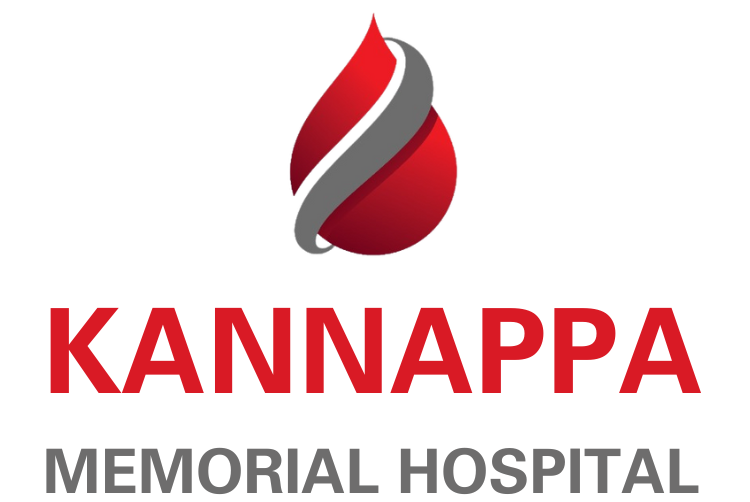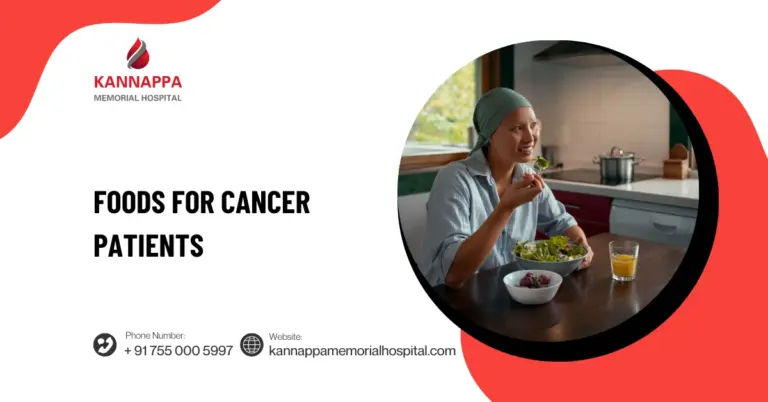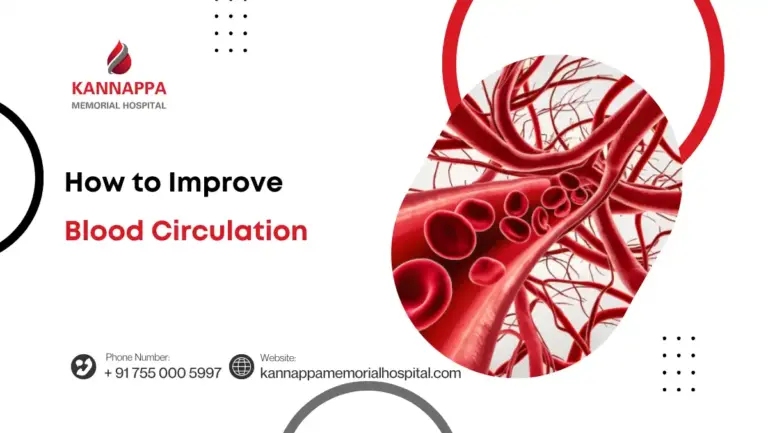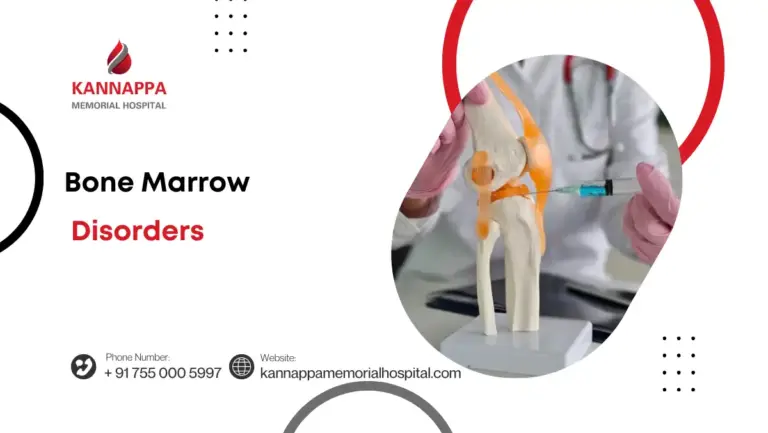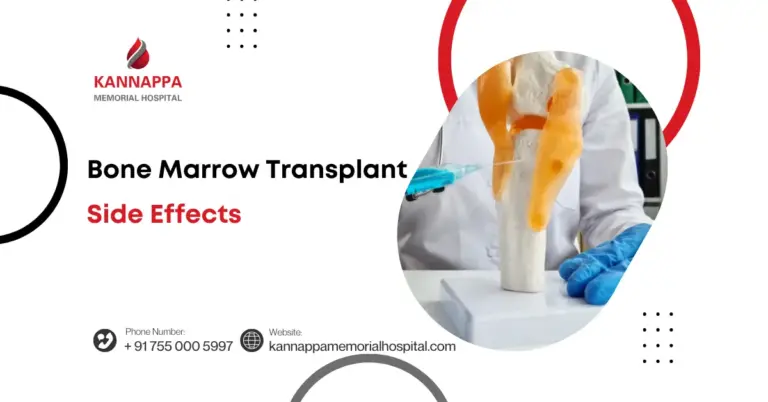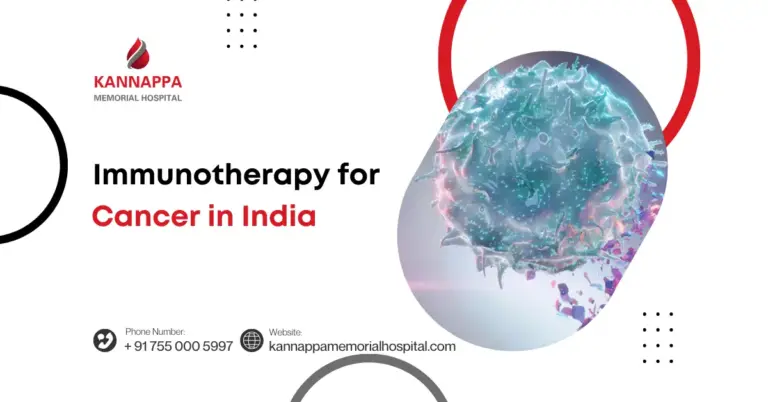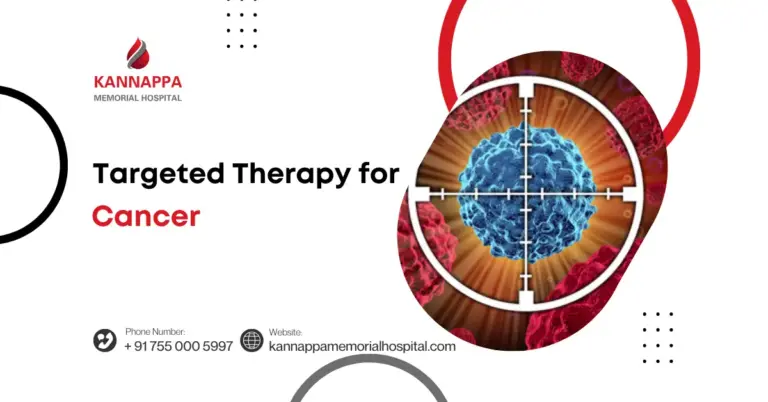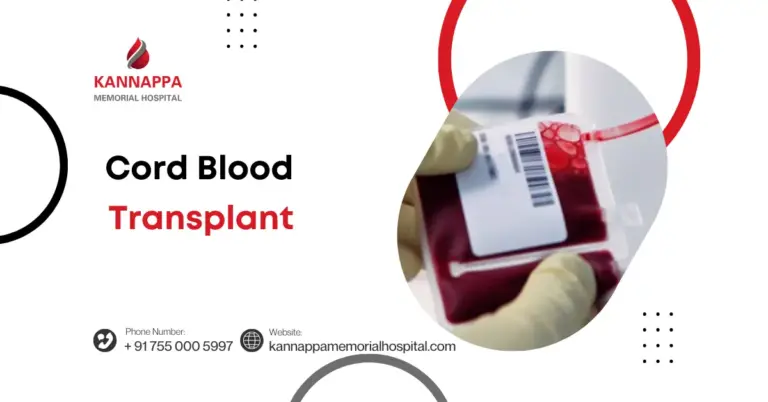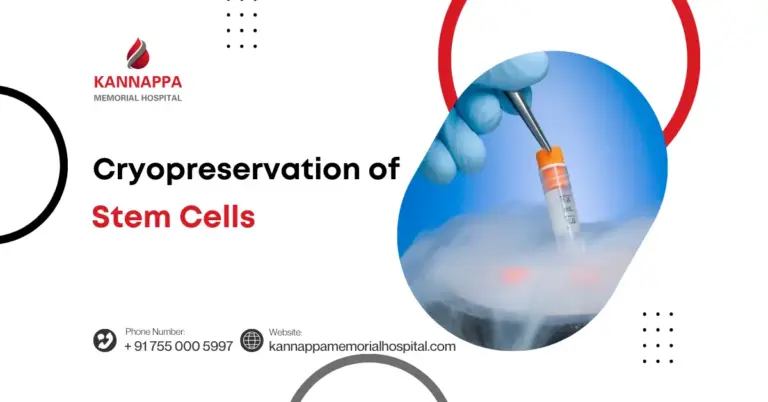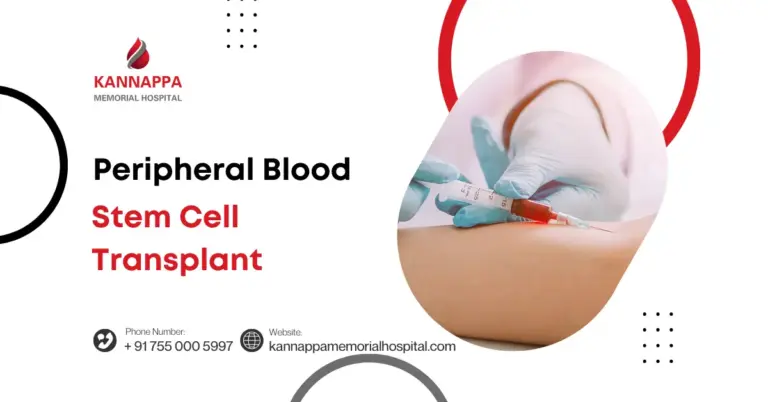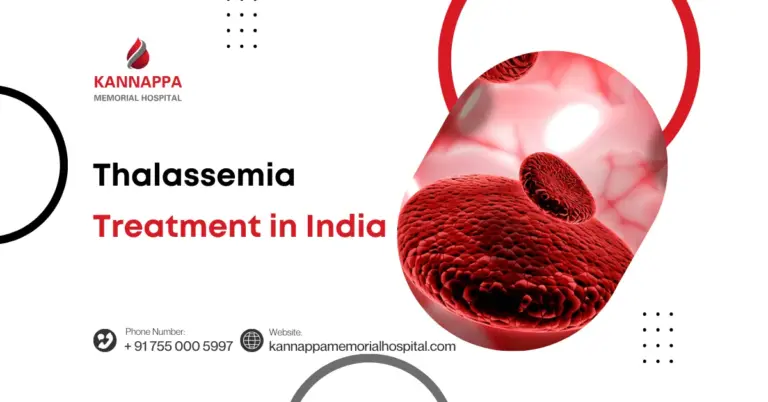Foods for Cancer Patients play a critical role in the journey of cancer recovery and treatment. As cancer and its therapies can significantly affect a person’s appetite, digestion, and overall energy levels, maintaining a balanced and tailored diet becomes essential. Eating the right kinds of foods for cancer patients can help preserve strength, tolerate treatments better, and support the healing process. Research highlights that a well-structured nutritional plan can improve outcomes and quality of life for those undergoing treatment.
While each individual’s needs vary depending on their type and stage of cancer, focusing on nutrient-dense meals can make a tangible difference. From easing side effects like nausea to bolstering immunity, food for breast cancer patient profiles and general food list for cancer patients have become essential parts of integrative care.
How Does Cancer Treatment Affect Your Diet?
- Impact on Appetite and Digestion: Cancer treatments such as chemotherapy and radiation can alter taste, reduce appetite, and cause nausea or mouth sores, making it difficult for patients to maintain adequate nutrition.
- Importance of Balanced Nutrition: A diet rich in proteins, vitamins, and antioxidants helps strengthen the immune system, repair tissues, and support recovery during and after treatment.
- Recommended Foods for Cancer Patients: Soft, easy-to-digest options such as cooked vegetables, whole grains, eggs, lean meats, lentils, and fresh fruits help maintain energy levels and promote healing.
- Hydration Support: Staying well-hydrated with water, clear soups, and herbal teas assists in detoxification and reduces treatment-related side effects.
- Foods for Cancer Patients to Avoid: Limit processed foods, red meats, sugary snacks, fried foods, and items high in preservatives or artificial additives, as they may increase inflammation and hinder recovery.
- Individualized Dietary Plans: Each patient’s nutritional needs vary based on the type of cancer and treatment; hence, consulting a dietitian ensures a customized meal plan that supports strength and overall well-being.
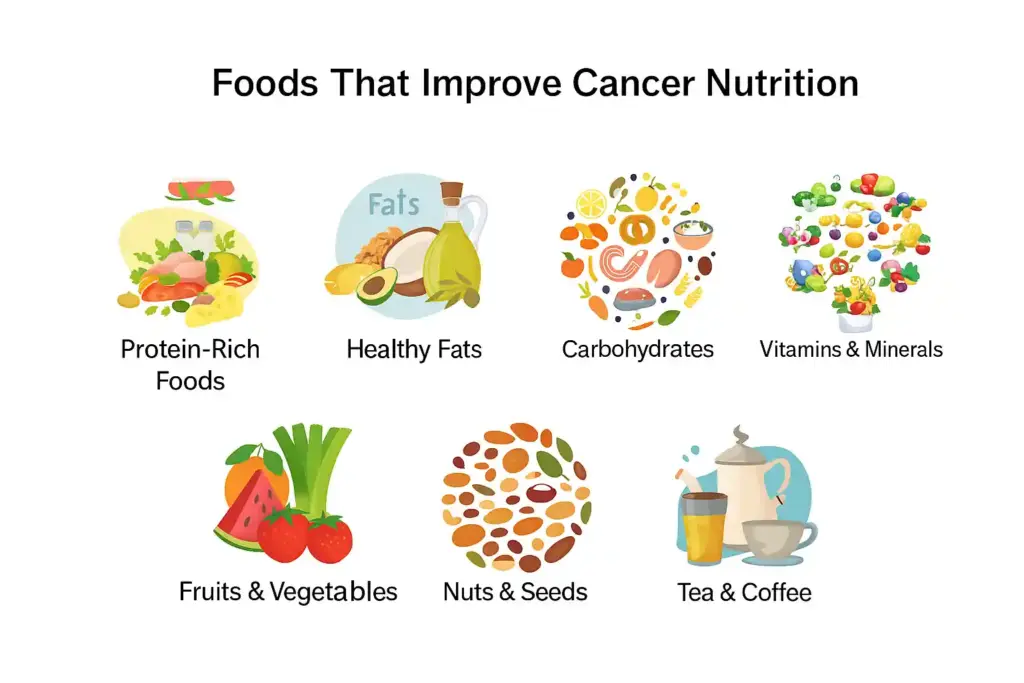
15 Foods for Cancer Patients
Maintaining a nutrient-rich diet is essential for Foods for Cancer Patients to support immunity, manage side effects, and maintain energy levels. Certain foods provide essential vitamins, minerals, antioxidants, and anti-inflammatory compounds, while others should be limited to reduce complications. Here’s a complete food list for cancer patients with practical guidance on what to eat and what to avoid.
Berries
Berries, including blueberries, strawberries, and raspberries, are rich in antioxidants and polyphenols that protect cells from damage caused by free radicals. Including berries regularly can help repair cells and provide natural energy, making them an important food for breast cancer patient.
Key points:
- Rich in vitamin C to enhance immunity.
- Polyphenols help neutralize oxidative stress.
- Support cardiovascular function and reduce inflammation.
- Can be consumed raw, in smoothies, or as toppings.
- Provide natural fiber to aid digestion.
Cruciferous Vegetables
Cruciferous vegetables like broccoli, cauliflower, and Brussels sprouts contain compounds that support natural detoxification and cellular protection. These vegetables are important additions to any food list for cancer patients.
Key points:
- Contain glucosinolates that protect cells.
- High in vitamins A, C, and K to strengthen immunity.
- Provide fiber for digestive health.
- Can be lightly steamed or roasted to retain nutrients.
- Include antioxidants that maintain cellular integrity.
Fish
Fatty fish such as salmon, mackerel, and sardines are excellent sources of omega-3 fatty acids, reducing inflammation and supporting heart and brain function. Fish is considered a key food for breast cancer patient.
Key points:
- Omega-3s improve cardiovascular health.
- Protein content supports muscle strength.
- Anti-inflammatory properties aid in recovery.
- Vitamin D supports bone and immune health.
- Best consumed baked, grilled, or steamed.
Nuts
Nuts like almonds, walnuts, and cashews provide healthy fats, protein, and antioxidants, making them excellent additions to a food list for cancer patients.
Key points:
- Rich in vitamin E to protect cells.
- Healthy fats reduce inflammation.
- Protein content supports muscle maintenance.
- Can be eaten between meals or included in recipes.
- Contain minerals such as magnesium and zinc to boost immunity.
Legumes
Legumes, including lentils, chickpeas, and beans, are packed with plant-based protein and fiber. They are a vital part of Foods for Cancer Patients diets.
Key points:
- Provide protein for tissue repair.
- Contain fiber to support gut health.
- Include folate and iron to maintain blood health.
- Help stabilize blood sugar levels.
- Can be used in soups, stews, or salads.
Dark Chocolate
Dark chocolate with minimal sugar contains flavonoids that reduce inflammation and act as antioxidants. Including dark chocolate in moderation benefits food for breast cancer patient diets.
Key points:
- Flavonoids improve cardiovascular function.
- Contains magnesium to reduce fatigue.
- Supports immune system through antioxidant activity.
- Can be included as a healthy snack.
- Helps regulate mood and stress levels.
Leafy Greens
Leafy greens like spinach, kale, and Swiss chard are rich in essential vitamins, minerals, and powerful antioxidants. They should be included in any food list for cancer patients to support cellular repair and immunity.
Key points:
- High in vitamin K to support bone health.
- Fiber content aids digestion and detoxification.
- Rich in vitamin C to boost immunity.
- Contain antioxidants for cellular protection.
- Can be added to salads, soups, or smoothies.
Fermented Foods
Fermented foods like yogurt, kefir, and kimchi are rich in probiotics, maintaining gut health and improving nutrient absorption. They are essential in Foods for Cancer Patients dietary plans.
Key points:
- Probiotics enhance digestive health.
- Maintain a healthy balance of gut bacteria.
- Reduce inflammation in the digestive tract.
- Improve tolerance to treatments.
- Can be consumed as snacks or side dishes.
Garlic
Garlic contains allicin and other bioactive compounds with anti-inflammatory and antimicrobial effects. It is an effective food for breast cancer patient inclusion.
Key points:
- Allicin supports immune defense.
- Contains antioxidants to protect cells.
- Helps regulate blood pressure.
- Can be added to cooked meals.
- Supports liver detoxification.
Eggs
Eggs are a complete source of protein and essential nutrients, providing energy and supporting tissue repair. They are recommended in food list for cancer patients.
Key points:
- Contain all essential amino acids.
- Rich in choline for brain function.
- Provide easily digestible protein.
- Can be boiled, scrambled, or made into omelets.
- Include vitamin B12 and selenium for immunity.
Cottage Cheese
Low-fat cottage cheese is rich in protein and calcium while being easy to digest. It is ideal for Foods for Cancer Patients who need easy-to-consume protein sources.
Key points:
- Supports muscle maintenance and repair.
- Calcium strengthens bones.
- Easy to include in meals or snacks.
- Mild taste suitable for sensitive palates.
- Contains vitamin B12 to support blood health.
Bananas
Bananas are a rich source of potassium and natural sugars, providing energy and supporting digestion. They are useful in food for breast cancer patient diets.
Key points:
- Supply natural energy to combat fatigue.
- Gentle on the digestive system.
- Contain fiber to support bowel movements.
- Potassium helps maintain electrolyte balance.
- Can be eaten raw or blended into smoothies.
Avocado
Avocados provide healthy fats, fiber, and essential vitamins, supporting nutrient absorption and reducing inflammation. They are recommended in food list for cancer patients.
Key points:
- Monounsaturated fats promote heart health.
- Fiber supports digestion.
- Improve absorption of fat-soluble vitamins.
- Potassium regulates blood pressure.
- Can be added to salads, spreads, or smoothies.
Sweet Potatoes
Sweet potatoes are high in beta-carotene and fiber, supporting immunity and digestive health. They are an important part of Foods for Cancer Patients diets.
Key points:
- Beta-carotene boosts immune function.
- Fiber aids digestion.
- Complex carbohydrates provide steady energy.
- Rich in vitamin C and potassium.
- Can be baked, boiled, or mashed.
Tomatoes
Tomatoes are rich in lycopene, a powerful antioxidant that protects cells and supports heart health. They are recommended in food for breast cancer patient diets.
Key points:
- Lycopene helps reduce oxidative stress.
- Rich in vitamin C to support immunity.
- Potassium supports heart health.
- Can be eaten raw, cooked, or in sauces.
- Supports skin and cellular health.
Indian Diet Plan for Cancer Patients
| Meal Time | Recommended Foods for Cancer Patients | Purpose / Benefits |
|---|---|---|
| Early Morning | Warm water with turmeric or lemon, soaked almonds | Boosts metabolism, provides antioxidants, and aids digestion |
| Breakfast | Oatmeal or vegetable poha with curd, fresh fruits like papaya or banana | Offers fiber, probiotics, and energy for the day |
| Mid-Morning Snack | Fresh coconut water or vegetable juice (carrot, beetroot, spinach) | Hydrates and replenishes essential vitamins and minerals |
| Lunch | Brown rice or whole wheat chapati with dal, lightly cooked vegetables, and a small portion of paneer or fish | Supplies balanced protein, fiber, and complex carbohydrates for strength |
| Evening Snack | Roasted chickpeas, fruit smoothie with flax seeds | Provides plant-based protein and healthy fats to maintain energy levels |
| Dinner | Moong dal khichdi or vegetable soup with whole grain toast | Easy to digest, supports recovery, and prevents bloating |
| Before Bed | A glass of warm milk with a pinch of turmeric | Promotes restful sleep and contains natural anti-inflammatory properties |
Conclusion
Nutrition is a cornerstone of cancer care, serving not just as fuel, but as a critical component of healing and resilience. The right foods for cancer patients can empower individuals to face treatment with strength, manage side effects, and support the body through recovery. With the proper guidance, even a simple food list for cancer patients can become a powerful health strategy.Those following a food for breast cancer patient diet benefit from specific nutrients that complement their treatment plans. Being mindful of foods for cancer patients to avoid ensures a safer healing process. By prioritizing whole, nourishing foods, patients can take an active role in their recovery, one meal at a time.
